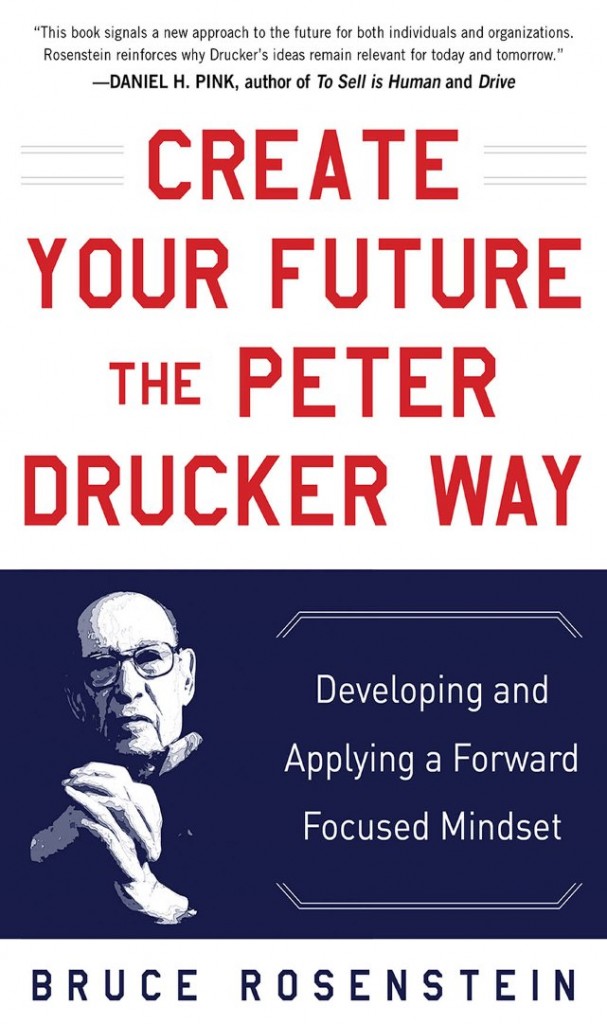
November 22 marks the tenth anniversary of the official publication date of my second book, Create Your Future the Peter Drucker Way: Developing and Applying a Forward Focused Mindset, by McGraw-Hill Education and Brilliance Audio (now Brilliance Publishing).
The world has changed in almost unimaginable ways since then, but my idea to make the content as evergreen as possible remains valid. The book is not about predicting the future, but how to approach the future, inside and outside the workplace.
As I write in the book, “Peter Drucker’s writing on the future was sharp and perceptive. In helping you to best understand his approach to the subject, I have organized into a framework his ideas on the subject, beginning with what I believe are the 10 main elements, Drucker’s core beliefs about the future. These elements, outlined below, can be applied by both individuals inside and outside the workplace, as well as by organizations, business or otherwise.”
The book’s terminology of Drucker’s 10 Elements of the Future is mine, though the ideas are based on many years of study of Drucker’s work, including my interviews with him for my books, and earlier for USA TODAY. As I write in Chapter 1, “My study of Drucker’s teaching and writing about the future has led me to distill and delineate a number of elements, outlined below and throughout the book, that are crucial to understanding how he approached the future. Although he wrote and taught about these areas, he did not group them together in the manner I have done for this book.”
Mindset: Keeping the future in mind as you go about your daily life and work.
Uncertainty: Don’t assume the future will be similar to today.
Creation: The future must be built/created.
Inevitability: The concept of ‘The Future That Has Already Happened.’
Present moment: The future is based on the thoughts, decisions and actions you are making right now.
Change: Accept it as normal and ongoing, and organize yourself for constant change.
Reflection: What are the future implications of potential futures for your life and work?
Remove/improve: Based on Drucker’s idea of ‘systematic abandonment,’ coupled with kaizen (steady, incremental improvement).
Innovation/Entrepreneurship: This formed the basis of his influential 1985 book, Innovation and Entrepreneurship.
Risk: Accepting and facing challenges from disruption, turbulence and more.
The immediate time around the book’s release provides terrific memories for me, particularly the book launch at The Writer’s Center, in Bethesda, Md., near where I live, and a book signing as part of the 2013 Drucker Day at the Drucker School of Management at Claremont Graduate University, in Claremont, Cal.
Berrett-Koehler, which published my first book, Living in More Than One World: How Peter Drucker’s Wisdom Can Inspire and Transform Your Life, decided to pass on my second. However, my agent, John Willig, placed it with Knox Huston, an editor at McGraw-Hill who had been a champion of my work. That was significant to me, as Knox worked on The Daily Drucker when he was at HarperCollins. Separately, John placed the audio rights at Brilliance with Joe McNeely and Gary Krebs; and the audio version is narrated by Tom Parks.
My wife, Deborah Goodman, a professional editor, guided me especially in the hectic final days and weeks leading up to my manuscript deadline. As I write in the acknowledgments: “She was able to help me think more clearly about what I really wanted to say, and helped me find the best language for expressing it.” I also want to acknowledge the expert work on the book by Richard Rothschild, President and Publisher of Print Matters Productions, and his colleague David Andrews.
Regarding the above element of change, consider that Knox Huston and the other main people at McGraw-Hill who worked on my book (Chelsea Van der Gaag, Ann Pryor, Stacey Ashton, and Lydia Rinaldi) are no longer with the publisher.
Another instance of change: a number of people featured in Create Your Future have since passed away, including Doris Drucker, Frances Hesselbein, Joseph A. Maciariello, Mihaly Csikszentmihalyi, Bob Buford, Warren Bennis, Max De Pree, Albert Bandura, Herbert Benson, Alexander and Helen Astin, William Bridges, and Huston Smith.
In a follow-up post next week, I’ll write about some of the memorable in-person events that happened within the first couple of years of publication, and will include links for some of the articles and posts related to the book, many of which came about through the work of my independent publicist, Patti Danos.
In the meantime, I remain super-grateful to Daniel Pink for his fantastic front cover endorsement, which we rightly gave top billing above the title and my byline! His words continue to hold great meaning for me: “This book signals a new approach to the future for both individuals and organizations. Rosenstein reinforces why Drucker’s ideas remain relevant for today and tomorrow.”
